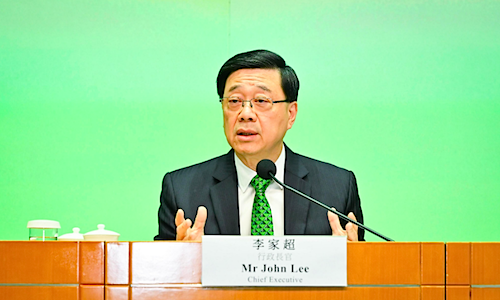Financial Highlights From Hong Kong’s 2025 Policy Address
Hong Kong leader John Lee has unveiled his fourth policy address with a series of measures aimed at boosting financial services. finews.asia reviews some of the top highlights for the industry.
Hong Kong will look to build on the momentum of a rebound in the financial sector, which saw a series of achievements in 2025 including its return to becoming the top IPO center globally with more than HK$100 billion ($13 billion) in funds raised in the first half of the year.
According to Hong Kong chief executive John Lee’s 2025 policy address, a series of measures and efforts will be introduced to further boost the city’s financial hub status.
«Backed by strong national support and a high degree of global connectivity, Hong Kong is recognised worldwide as an international centre in finance, trade and shipping, as well as in aviation, legal services and dispute resolution,» Lee said. «The Government will fully leverage these institutional strengths to consolidate Hong Kong's status as a premier international hub.»
Encouraging Mainland Banks to Set Up HQ
As part of its goal of attracting companies to set up in Hong Kong, the government will set up a «GoGlobal Task Force» which will involve resources from multiple departments and be steered by the Secretary for Commerce and Economic Development.
For the financial sector, the Hong Kong Monetary Authority (HKMA) will encourage banks, especially those from mainland China, to set up regional headquarters in the city to further expand into international markets such as Southeast Asia and the Middle East.
Stock, Bond and FX Market
For capital markets, the policy address highlighted continued efforts to strengthen Hong Kong’s stock, bond and currency markets.
Notable highlights include the inclusion of a renminbi (RMB) trading counter under the cross-border Southbound trading channel for Hong Kong stocks, establishing bond links with markets such as Switzerland and the UAE and further focus on developing the city as an offshore yuan hub, including considerations of «settling government expenditure in RMB under suitable circumstances».
International Gold Trading Market
A relatively new area of focus has been gold with Lee having accepted the recommendations of a working group aimed at promoting market development for the precious metal.
Initiatives that will be implemented include supporting the establishment of gold storage facilities with a target capacity of 2,000 tons in three years, forming a central clearing system and setting up a related trade association. The government will also encourage gold traders to set up or expand refineries in Hong Kong and offer a greater variety of investment vehicles and products, such as tokenized gold.
Risk, Asset and Wealth Management
For risk management, the government will encourage the participation of insurance funds in infrastructure financing with plans to amend the legislation next year to lower capital requirements for infrastructure investment and provide concessions for local projects.
On asset and wealth management, there will be further enhancement of the preferential tax regimes for funds, single family offices and carried interest.
To attract more wealth from the ultra-rich, the city’s investment immigration program – the Capital Investment Entrant Scheme (CIES) – will be eased with the maximum amount of investment to be counted raised from HK$10 million to HK$15 million for the purchase of non-residential properties. For home purchases, the HK$10 million cap remains but the transaction price threshold will be lowered from HK$50 million to HK$30 million.
Fintech and Sustainable Finance
The address said it would continue to support «steady development of fintech» highlighting the newly introduced stablecoin regime and the possibility of offering a wider range of digital asset products and services to professional investors.
On green and sustainable finance, Hong Kong will deepen pilot co-operation with the Greater Bay Area carbon market, testing cross-border trade settlement and jointly building a regional carbon market ecosystem. The government will also study China’s participation in the international carbon market, including the formulation of voluntary carbon credit standards and methods, as well as the registration, trading and settlement of carbon emission reduction.
«Today, Hong Kong is at the critical juncture of advancing from stability to prosperity. We are moving through an irreversible economic transition, but it is an essential process for a stronger and more robust economy in the future,» Lee added. «We must not be complacent, nor should we underestimate our own capabilities.»


























